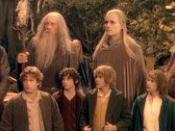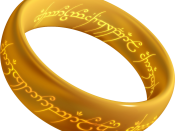Power is every-thing, it has almost become a proverb that: power corrupts, and absolute power corrupts absolutely. Being a solider in World War One would definitively show that this is to be true or at least that power does not show intelligence. The works that were born out of a need for more information 'hobbits' show that J.R.R. Tolkien wishes for us to distribute power in order that it can not complicate matters and bring ruin to the world. I believe that J.R.R. Tolkien held this true and it shows through in his works. There are many examples that come through in "The fellowship of the Ring" and his other works.
Gandalf the Grey, the wandering wizard is not the only Istari that is bound to middle earth's fate. Tolkien puts four of these great Angelic like beings that are not bound to time but rather to their quest.
The other three are Radagast the Brown, Saruman the white and the last is unknown to us. The fact that four of these great wizards were needed to take care of this task show that is important that there be not to much power in the hands of one. This is a wise decision as we learn that Saruman has already betrayed the free people of Middle earth and wishes to command the ring and unseat The Dark Lord of The Ring Sauron. Gandalf is actually destroyed in The Fellowship of the Ring, but is sent back to finish his quest by the great powers that nudge the hearts and fates of Mortal beings.
Another instance in which it is clear that Tolkien mistrusts power is in the way that he instructs Frodo in the use of the ring through Gandalf. When Frodo asks Gandalf to take the ring...


